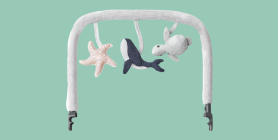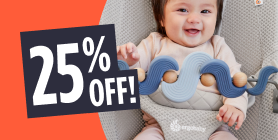SOURCES: http://en.wikipedia.org/wiki/Baby_colic
December 01, 2011
There is little that is more upsetting to parents of a newborn than his inconsolable wails and cries. To parents of a baby with colic, these bouts are all too common, and can cause turmoil and disharmony in even the most solid, happy families.
As the mother of three, I am well aware of the challenges of being a parent to a new being. Each baby is distinctly unique and different from his siblings. My first child had a lovely disposition – cheerful, happy, and content. I thought I had parenting completely figured out, and I wondered about parents who seemed frazzled or stressed by their newborn. What was so difficult about having an infant?
Enter child number two: born two weeks before his predicted due date, he was small and incredibly sensitive. His skin reacted to any fabric, with angry bumps. He rarely slept, except in increments of about ten minutes, from which he awoke shrieking. At around six p.m. each night, he descended into a furious fit of wailing that lasted for about an hour, during which time the rest of the family fell apart. Ever try to have a normal, relaxing conversation over a loud, incessantly screaming infant? It proved impossible for us, and we ended up snapping at one another; impatient, frustrated, and feeling like failures.
What were we doing wrong? Why was this sweet little being so miserable? We tried everything we could think of to alleviate his apparent suffering, from changing my diet (eliminating garlic, onions, spices - in case it was transferring to him through my breast milk); scheduled naps and feedings; changing positions while nursing; massaging his belly…nothing worked.
One night, out of sheer desperation, I put him in the newborn baby carrier and walked around the block. Aha! I was unsure whether it was the fresh air, the change in environment, the closeness to my body, or the rhythm of our steps, but he stopped wailing, took a few deep breaths, and fell fast asleep. I was delighted and my faith in myself as a mother was restored. The six p.m. walk became our nightly ritual, and we never experienced the misery of colic again.
Wikipedia describes colic as “a condition in which an otherwise healthy baby cries or displays symptoms of distress (cramping, moaning, etc.) frequently and for extended periods, without any discernible reason.” Any parent who has suffered through colic knows the extent of the stress and despair resulting from the condition. Adding to the frustration, though, is the fact that there are as many questions about the causes and treatment of colic as there are answers. Again, from Wikipedia:
Today, it is fairly well established that there are a variety of causes of colic symptoms, the most common of which include: stomach gas (due to poor burping or milk flow issues), intestinal gas (pocketed in the intestinal tract), neurological overload (the overwhelmed and overstimulated baby that becomes exhausted) and even a muscular type of colic (perhaps due to muscle spasm and birth trauma).
With all of these potential aggressors, how is an overwhelmed and exhausted parent to know which cause to treat, in order to alleviate baby’s misery?
Babywearing, as I discovered quite by chance, is an excellent option that may resolve several of the potential causes of colic at one time, while allowing a parent to continue to function normally. Soft Structured Carriers, such as the ERGObaby Carrier, keep babies in the optimal upright position to avoid reflux, which is one of the possible causes of colic. This type of carrier also keeps baby’s body securely positioned, close to his parent’s heart and safely wrapped in a womb-like environment. Add to that the gentle rhythm of the parent’s body motion – very familiar, if the mother is the one wearing the baby – and, it’s no wonder, fussy, upset infants are soothed by babywearing.
With baby secured on her body, mom can continue to function as usual, eliminating the additional stress of leaving chores or responsibilities incomplete while tending to the colicky baby. When baby calms down, so do the parents; the entire atmosphere becomes peaceful and calm, rather than stressful and chaotic. Imagine the difference for all members of the family!
Regardless of the cause of colic, it remains a major issue for approximately 15% of all babies. (Wikipedia) Consequences of colic can be very serious, including increased rates of shaken baby syndrome, relationship stress, breastfeeding issues, and postpartum depression, among others. In my own case, babywearing offered a safe, easy, and practical solution, benefitting every family member and strengthening the bond between myself and my son.

























